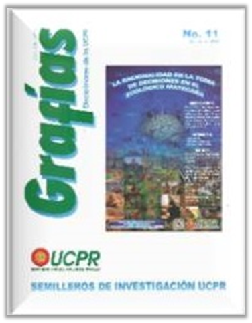Efectos de la guerra en las representaciones sociales de un grupo sobre su territorio: Las palabras de las víctimas
DOI:
https://doi.org/10.31908/grafias.v0i11.1577Palabras clave:
Representación social, guerra, grupo, territorioResumen
El presente artículo se cuestiona por los efectos directos que ha tenido la guerra en Colombia, efectos que van ligados a la forma como los grupos representan socialmente el territorio donde habitan, y están relacionados con las maneras de conocerlo, entenderlo, percibirlo, creerlo, hablarlo, sentirlo e interpretarlo. De este modo, se parte de una conceptualización teórica de la representación social, sus características y los elementos que la conforman. Posteriormente se realiza un acercamiento a las representaciones sociales que tienen los habitantes sobre su territorio tomando como base para ello sus propias enunciaciones y discursos, donde es posible evidenciar el cambio significativo en el modo en que estos perciben, interpretan y piensan su espacio antes y después de un suceso de guerra, lo que involucra también modificaciones en las relaciones y lazos que establecen con los demás, consigo mismos, con el territorio que dejaron y con el lugar donde actualmente viven, donde la verdad sobre lo sucedido se convierte en el principal pedido por parte de quienes se consideran las víctimas de estos trágicos sucesos, quienes por otro lado no han recibido por parte del Estado ni de la Comisión Nacional para la Reparación y la Reconciliación una respuesta clara y precisa, muestra de lo que sucede en un país donde la verdad sigue siendo un asunto cada vez menos preciso
Referencias
ÁLVAREZ, Ana María. (2008). El potencial psicosocial de la legión del afecto en el acompañamiento a comunidades afectadas por la violencia. Bogotá: Seminario Nacional de la Legión delAfecto.
ARAYA, Sandra. (2002). . Costa Rica: FLACSO.
BOLETÍN DE LACNRR. (2008). Nº 7 de Septiembre de 2008.
CASTILLO, Juan Pablo. (2006). ….Bogotá: www.juanpoablocastillohablaconlaverdad.blogspod.com. Noviembre 9 de 2009.
GÓMEZ, Paco. (2009). . Bogotá: Kaosenlared.net. Mayo 5 de 2009.
IBÁÑEZ, T. (1988). Barcelona, España: Sendai.
JODELET. Denise. (1984). La representación social: fenómenos, conceptos y teoría. En Moscovici, S. Psicología social II. Pensamiento y vida social. Psicología social y problemas sociales. Barcelona, España; BuenosAires,Argentina; México D.F., México: Paidós.
LEY DE JUSTICIAY PAZ. (2005). OficinaAlto Comisionado Para La Paz. Numero 211 de 2005 senado, 293 de 2005 Cámara.
MOSCOVICI, Serge. (1979). . BuenosAires,Argentina: Huemul S.A.
MOSCOVICI, Serge. (1991). . Barcelona, España: Paidós.
MOSCOVICI, Serge. (1984b). . Barcelona, España: Paidós. PADILLA, Nelson. (2009). . Bogotá: El Espectador. Julio 11 de 2009.
URIBE, María Victoria. (2009-8). . Bogotá: Fundación Social e Instituto Pensar de la Universidad Javeriana.

